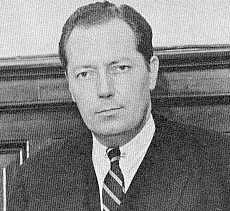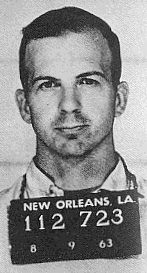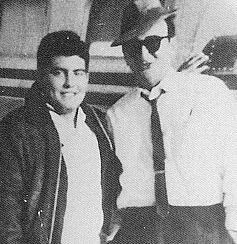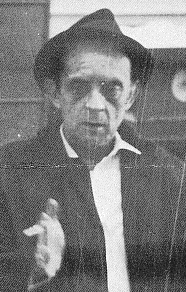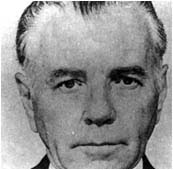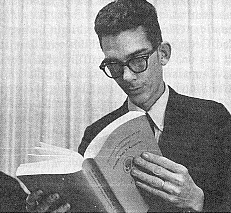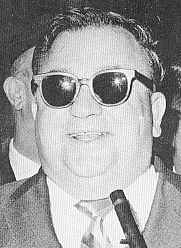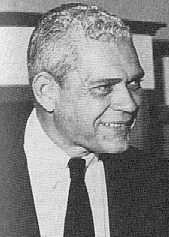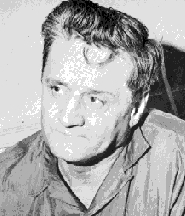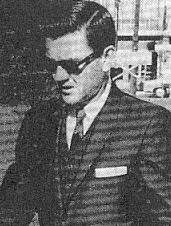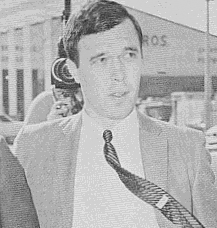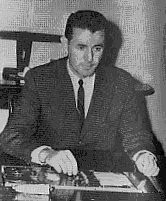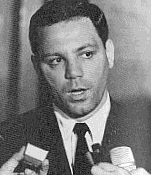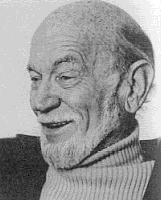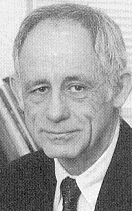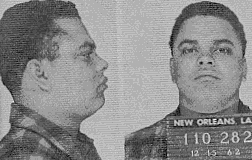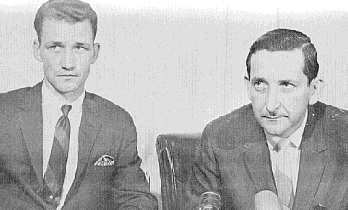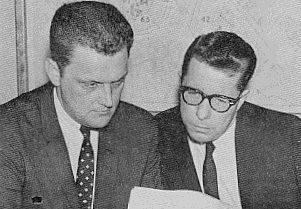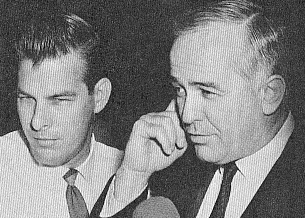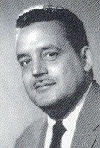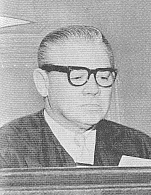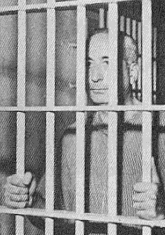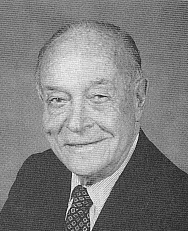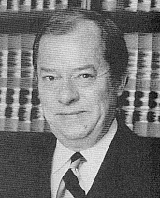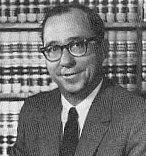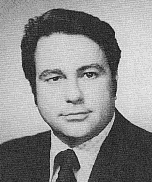
Who's Who in the Jim Garrison Case
Jim Garrison
The hero of Oliver Stone's extraordinary film, JFK, New Orleans District Attorney Jim Garrison (portrayed by Kevin Costner) believed that the John F. Kennedy assassination had been the work of CIA personnel, anti-Castro Cuban exiles, homosexuals, and ultra right-wing activists. "My staff and I solved the case weeks ago," Garrison announced in February 1967. "I wouldn't say this if we didn't have evidence beyond a shadow of a doubt." When Garrison brought businessman Clay Shaw to trial, however, no such evidence materialized. Jury foreman Sidney Hebert even said he thought more highly of the Warren Report after the trial than before. Today, most reputable conspiracy-oriented authors have denounced Garrison as a complete fraud.
Lee Harvey Oswald
As depicted in JFK, accused assassin Lee Harvey Oswald (given an aptly enigmatic performance in Stone's film by Gary Oldman) spent the summer of 1963 in New Orleans. Jim Garrison theorized that Oswald's image as a loner and a Marxist was merely a front, and that he had been set up to take the fall in an assassination plot involving New Orleans residents. Many conspiracy theorists continue to believe so.
David Ferrie
Memorably portrayed in JFK by Joe Pesci, David Ferrie (above right, with Bay of Pigs veteran Julian Buznedo) was a highly eccentric pilot and scholar who drove from New Orleans to Houston the night of the assassination, on vacation with two friends. Though the trip was thoroughly investigated by the New Orleans Police Department, the Houston Police, the FBI, and even the Texas Rangers, Garrison was convinced it had something to do with JFK's death. When Ferrie died on February 22, 1967, Garrison quickly labeled him "one of history's most important individuals."
Jack Martin
Jack S. Martin (Jack Lemmon in Stone's JFK) came forward the day after the assassination with a variety of tales about Dave Ferrie, such as the claim that Ferrie "may have hypnotized Oswald and planted a post-hypnotic suggestion that he kill the President." Martin, born Edward Stewart Suggs, was no Jack Lemmon -- he was a diagnosed sociopath and admitted alcoholic with a rap sheet and a history of furnishing false information to the authorities, and he nursed a burning grudge against former pal Dave Ferrie.
W. Guy Banister
In 1963, former FBI Special Agent in Charge Guy Banister was a private investigator, ultra right-wing activist, and associate of David Ferrie's, with an office just around the corner from 544 Camp Street, an address curiously stamped by Lee Oswald on a batch of pro-Castro literature that summer. As depicted in Stone's movie (with Ed Asner in the role of the ex-G-man) Jim Garrison believed that Oswald and Banister must have been working together.
David Lewis
David Franklin Lewis was a roommate of Jack Martin's who'd been discharged from the Navy for "psychiatric" reasons. He tried to bolster Martin's tales, but ended up only an embarrassment to Garrison, which is presumably why he's left out of Stone's film. (In an attempt to boost his credibility, for example, he staged a fake assassination attempt on himself. A polygraph examination indicated deception and he confessed.) Oddly enough, when the DA claimed that he had "solved the case," his "evidence beyond a shadow of a doubt" consisted of the statements of Jack Martin and David Lewis -- and nothing else.
Dean Andrews
Dean Adams Andrews, Jr. (John Candy in JFK) was the jive-talking attorney who told the Warren Commission that he'd been asked by a "Clay Bertrand" to represent Lee Oswald in Dallas. He described "Bertrand" as a "swinging cat" who occasionally guaranteed fees for some of his homosexual clients. Neither federal nor local authorities were able to locate any trace of a "Clay Bertrand" in New Orleans.
Clay Shaw
A successful businessman, playwright, and pioneer of restoration in New Orleans' French Quarter, Clay Shaw (Tommy Lee Jones in Stone's film) was Jim Garrison's candidate for the elusive "Clay Bertrand." Garrison's evidence? Shaw was a homosexual, the DA observed, and his first name was Clay. Shaw adamantly denied being "Bertrand," insisted he'd never met Lee Oswald, and strenuously denied having anything to do with the death of the man he called "a splendid president." "If there was any one person in New Orleans who believed in John F. Kennedy," a friend of his remarked, "it was Clay Shaw."
Eugene C. Davis
When Dean Andrews refused to name Clay Shaw as "Clay Bertrand" to the Orleans Parish Grand Jury, he was charged with perjury. He then confessed that he had used the phony "Bertrand" name as a cover for his friend and client, Gene Davis, operator of a gay bar in the French Quarter. Davis didn't know Oswald, Andrews explained, but a phone conversation with him had given him the idea to represent the accused assassin. For obvious reasons, he was not mentioned in Stone's film.
Aloysius Habighorst
Officer Aloysius Habighorst of the NOPD testified that when he booked Clay Shaw, he asked Shaw if he used any aliases, and Shaw responded, "Clay Bertrand." However, Captain Louis Curole had assigned Sgt. Jonas Butzman to guard Shaw during the procedure, and Sgt. Butzman testified that Habighorst had not questioned Shaw, and that the name "Clay Bertrand" had not been spoken by either man. Habighorst also stated that Shaw had been allowed to have his lawyer present for the procedure, a claim flatly contradicted by several eyewitnesses. Even Mark Lane, a close personal friend and longtime supporter of Jim Garrison's, blasted Oliver Stone for his handling of this episode.
Perry Russo
Following the death of David Ferrie, Perry Raymond Russo contacted the DA's Office to say he'd known Ferrie in the early Sixties and that Ferrie had spoken about assassinating the President. He became Jim Garrison's star witness when he claimed to have overheard Ferrie plotting the assassination with a white-haired man named "Clem Bertrand," whom he identified as Clay Shaw. Two years after the Shaw trial, Russo recanted his entire story. Incredibly, he was not portrayed in Stone's JFK, although his testimony became part of the basis for the fictional "Willie O'Keefe" (Kevin Bacon).
Edward O'Donnell
Lt. Edward O'Donnell of the New Orleans Police Department was ordered by Jim Garrison not to reveal that Perry Russo had been unable to complete a polygraph test administered by O'Donnell in June 1967. Russo confessed to O'Donnell that his testimony against Shaw was false. O'Donnell, of course, was of no interest to Oliver Stone.
Andrew Sciambra
Assistant DA Andrew "Moo Moo" Sciambra helped develop the testimony of a number of Garrison's witnesses, including Perry Russo. His contribution to the investigation would become extremely controversial, and he was quietly omitted from Stone's film.
James Phelan
At the DA's invitation, Saturday Evening Post reporter Jim Phelan came to New Orleans thinking he had the inside track to the story of the century. Instead, he became the first outsider to discover major discrepancies in Perry Russo's story.
Richard Billings
As an editor at Life magazine, Richard Billings was one of a select few journalistic insiders to the DA's JFK probe. A longtime supporter of Garrison's, his influence upon the House Select Committee on Assassinations helped rehabilitate the former DA's tarnished image in the late 1970s.
Vernon Bundy
Heroin addict Vernon J. Bundy, Jr., testified that he saw Clay Shaw meet with Lee Oswald by the seawall at Lake Pontchartrain in 1963. When Bundy failed a polygraph examination, assistant DAs James Alcock and Charles Ward tried in vain to convince Garrison not to use Bundy as a witness. In exchange for Bundy's gracious assistance, Garrison quietly sprung Bundy from prison.
Alvin Beauboeuf
Al Beauboeuf (above left, with attorney Burton Klein) was one of two men who accompanied Dave Ferrie on his legendary drive to Houston. Beauboeuf was offered $3,000 and a position with an airline by Garrison investigator Lynn Loisel if he would "fill in the missing links" of Perry Russo's story. Attorney Hugh Exnicios surreptitiously tape-recorded the offer.
Charles I. Spiesel
Intelligent and articulate, New York accountant Charles Spiesel made a devastating witness against Clay Shaw -- until his cross examination, when he revealed that he had a $16 million lawsuit pending against the City of New York for conspiring against him, sending some fifty or sixty people to hypnotize him, ruining his business, destroying his sex life, and planting look-alikes of his family in his own home.
Alvin Oser and James Alcock
Assistant District Attorney Jim Alcock (above right) led the prosecution at the 1969 trial of Clay Shaw, with Assistant DA Al Oser (above left) handling the bulk of the testimony and arguments related to the Warren Report.
Louis Ivon and William Gurvich
Bill Gurvich (above right) was a DA's Office investigator who resigned his position in June 1967 and went public with his belief that Garrison's case against Clay Shaw was a fraud. Lou Ivon (above left) was one of Garrison's right-hand men during the JFK probe.
Sergio Arcacha Smith
Out of an office at 544 Camp Street, Sergio Arcacha Smith had been involved in raising funds for the fight against Castro. Arcacha had briefly been an associate of Dave Ferrie's, in mid-1961, and was an early suspect in Garrison's probe. By the time Oswald arrived in New Orleans, however, Arcacha had left both the crusade against Castro and the state of Louisiana behind.
Judge Edward Haggerty
"[Jim Garrison] violated [the pre-trial guidelines to refrain from speaking to the press about the case] more than anyone else. . . . That, in and of itself, it shows you the whole theory behind Garrison. It was not ever leading up or possibly looking for a conviction. He wanted to blast the Warren Commission . . . He was big enough to do it. Damn it, he did it."
Aaron Kohn
Aaron Kohn was managing director of the Metropolitan Crime Commission, a citizens' watchdog group in New Orleans. Garrison cut off all contact with the commission in late 1966, when Kohn began vocally challenging the DA's claim that there was no organized crime in New Orleans. "I [said when the JFK probe began] I thought it was going to turn out to be a fraud, because this is the way Garrison has functioned."
F. Irvin Dymond
Attorney F. Irvin Dymond led Clay Shaw's defense team, which also included Edward Wegmann, William Wegmann, and Salvatore Panzeca. "The twelve men who pass on this case are actually going to create history in our country. Gentlemen, I implore you not to make a mistake."
Edward Wegmann
When attorney Edward Wegmann received a phone call stating that his longtime friend and client Clay Shaw had been arrested for conspiracy to assassinate the President, Wegmann barked, "I'm in no mood for jokes," and hung up.
William Wegmann
"You have to understand that district attorneys in this area for years controlled the political system at Tulane and Broad."
Salvatore Panzeca
"I recognized Mr. Shaw's name when he identified himself. And I simply took the position -- well, I'll be down there and we'll straighten it out."


Resources on the Jim Garrison case

